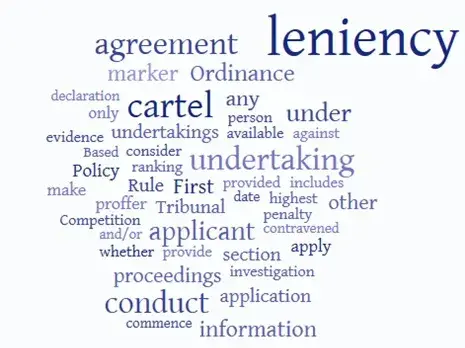MCA Notifies the Incorporation (Amendment) Rules, 2017: Doing Business in India further SPICe-d and Digitized

On January 25, 2017 the Companies (Incorporation) Rules, 2014 were amended by the Companies Incorporation (Amendment) Rules, 2017 (Revised Rules) and the same came into effect from January 30, 2017. Under this amendment the newly fashioned version of ‘ SPICe’ (Simplified Proforma for Incorporating Company Electronically) now necessitates obligatory submissions for both PAN (Permanent Account Number) and TAN (Tax Deduction Account Number) for all new filings
Competition Commission can be Lenient: Legal Scaffold vis a vis the Indian Railway Case
 The Competition Commission of India (CCI) initiated a suo moto inquiry pertaining to cartelization against Pyramid, Kanwar, and Western for supply of Brushless DC Fans and other electrical goods on receiving information from CBI on April 1, 2014, the information was taken into cognizance on June 23, 2014. CBI had received information from North Eastern Railway and the Northern Railways regarding the tender bids filed by the abovementioned entities.
The Competition Commission of India (CCI) initiated a suo moto inquiry pertaining to cartelization against Pyramid, Kanwar, and Western for supply of Brushless DC Fans and other electrical goods on receiving information from CBI on April 1, 2014, the information was taken into cognizance on June 23, 2014. CBI had received information from North Eastern Railway and the Northern Railways regarding the tender bids filed by the abovementioned entities.
SEZ rules relaxed to allow entry of foreign accountants and lawyers
 Recently, on January 3, 2017, the Government of India amended the Special Economic Zone Rules, which could make Legal and Accountancy services from foreign entities possible in the Special Economic Zones. The move is been seen as a baby step towards opening India’s legal accounting sectors to foreign players.
Recently, on January 3, 2017, the Government of India amended the Special Economic Zone Rules, which could make Legal and Accountancy services from foreign entities possible in the Special Economic Zones. The move is been seen as a baby step towards opening India’s legal accounting sectors to foreign players.
CCI’s Whip on DLF: ‘Cease and Desist Unfair Trade Practices
 The Informant alleged DLF of abusing its dominant position by imposing highly arbitrary, discriminating and perverse conditions on the apartment buyers through the Agreement.
The Informant alleged DLF of abusing its dominant position by imposing highly arbitrary, discriminating and perverse conditions on the apartment buyers through the Agreement.
MCA Notifies the Incorporation (Amendment) Rules, 2017: Doing Business in India further SPICe-d and Digitized

Source:Internet
On January 25, 2017 the Companies (Incorporation) Rules, 2014 were amended by the Companies Incorporation (Amendment) Rules, 2017[1] (Revised Rules) and the same came into effect from January 30, 2017. Under this amendment the newly fashioned version of ‘SPICe’ (Simplified Proforma for Incorporating Company Electronically) now necessitates obligatory submissions for both PAN (Permanent Account Number) and TAN (Tax Deduction Account Number) for all new filings. As notified by the Ministry of Corporate Affairs (MCA) for cases marked for resubmission prior to January 30, 2017, stakeholders are required to download the older version of SPICe form for resubmission. The filing of SPICe forms including resubmissions will be accepted by MCA from February 1, 2017 onwards.
As per reports, the revised format requires fresh applicants to submit duly signed PAN and TAN forms linked with the SPICe form and these corollary linked forms for PAN and TAN will be auto generated once the SPICe forms are submitted with the MCA21 system[2]. Therefore, the new version of SPICe application will be processed after Forms 49A for PAN and 49B for TAN are duly filed and the payment of requisite fee is confirmed by the MCA.
Rule 18 of the Revised Rule mentions that Certificate of Incorporation shall be issued by the registrar in Form INC-11[3] and shall also mention the PAN of the Company where if it is issued by the Income Tax Department.
Further, the notification[4] also released form INC-11, and INC-32 that have been revised to give effect to the above changes.
Way Forward
This move enables the creation of a single platform that enables digital submission of incorporation documents along with E Memorandum of Association and E Articles of Association within streamlined timeframes. This further underscores a consolidated attempt to incorporate companies together with tax identification of the entity. Therefore, these changes furthers ease of doing business in India.
[1]http://www.mca.gov.in/Ministry/pdf/IncorporatinRules_27012017.pdf
[2]Kritika Singh, New Companies Will Soon be Able to Apply For PAN, TAN Online,
http://www.livemint.com/Consumer/SdKN7pAL8Iq32wTxQRp0zI/New
-companies-soon-be-able-to-apply-for-PAN-TAN-online.html
[3]Certificate of Incorporation under Companies Act, 2013.
[4]Supra Note 1.
Introduction
Adam Smith once said, “People of the same trade seldom meet together”. However, if they meet, they may act together to hamper fair industry practices. The recent instance of cartelization[1] , bid rigging and collusive practice between M/s Pyramid Electronics (Pyramid), M/s R. Kanwar Electricals (Kanwar), and M/s Western Electric Trading Company (Western) against a tender raised by the Indian Railways and Bharat Earth Movers Limited goes on to re affirm that.
Cartels are agreements among firms in oligopolistic industries where members may agree to rig a bid or act collusively against fair market practices. The Competition Act, 2002 (Act) covers the same under anti-competitive practices under Section 3(1)[2] read along with Sections 3(3)(c)[3] and 3(3)(d)[4] of the Act.
The Competition Commission of India (CCI) initiated a suo moto inquiry pertaining to cartelization against Pyramid, Kanwar, and Western for supply of Brushless DC Fans and other electrical goods on receiving information from CBI on April 1, 2014, the information was taken into cognizance on June 23, 2014. CBI had received information from North Eastern Railway and the Northern Railways regarding the tender bids filed by the abovementioned entities. The tender quotes given by these entities were compared and uncanny similarities in the quoted bids were found. The Directorate General also relied upon various sources such as call records and email history between Pyramid, Kanwar, and Western to conclude that their bids were rigged.
Post investigation, under Section 27[5] of the Act, a penalty of 1% was imposed on Pyramid and Western on the profits earned by them in the year 2012-2013. A penalty was also imposed on Kanwar that was 3% of its turnover in the year 2012-2013. CCI had also imposed a fine on certain identified office bearers of these entities that equaled to 10% of the average income of these employees in the preceding three financial years.
Availing Leniency Policy under the Act
While the investigation was ongoing, Pyramid came out as a whistleblower and became an approver. For the first time since the Act was enacted, CCI operated the leniency provisions given under CCI (Lesser Penalty) Regulations, 2009 (Leniency Regulations) when Pyramid provided information about the formation of a cartel in which they too were a party, and received a reduction of 75% in the penalty that would have been imposed upon them. Therefore, it would not be incorrect to say that leniency provisions tackle with the “Pernicious practice of cartelization”[6] by bringing forth involved parties to admit to their wrongdoings and cooperate with the CCI.
In spirit, the leniency provision provided under Section 46[7] of the Act read with Regulation 5[8] of the Leniency Regulations offers an option to the persons/enterprises involved in anti-competitive practices to report their doings and deliver evidence to the CCI so as to obtain absolute immunity from any imposed penalty or a reduction of penalty which CCI would have otherwise imposed on them.
As per global practices Leniency Regulations also have a deterrent effect on cartel formation and destabilizes the operation of existing cartels as it seeds distrust and suspicion among cartel members[9]. However, the participating entity in a cartel should be the first to report to the CCI of an undetected cartel and provide sufficient relevant information[10] in order to claim for absolute immunity.
Therefore, going by the global standards and Indian Laws, if CCI possesses enough evidence to launch an investigation then the entity claiming relief under the Leniency Rules must provide evidence to conclusively prove the cartel infringement[11]. And, an entity that requests for obtaining CCI’s leniency may either receive significant reduction on fines imposed if the evidence given by them adds value to the investigation that is being conducted by the CCI.
Pyramid was the foremost and the only entity to admit to the bid rigging and cartelization that had been practiced and the evidence given by Pyramid solidified the suspicions of CCI and assisted to conclude the ongoing investigation against Pyramid, Kanwar, and Western. However, since the disclosures made by Pyramid were made at a later stage, the penalty was reduced by a margin of 75% and not absolutely as a result the imposition of a penalty of INR 6 Million (Approx.) was reduced to INR 1.5 Million (Approx.).
On the other hand, resulting from the disclosures made by Pyramid; Kanwar and Western were ordered to pay a penalty of INR 20 Million (Approx.) and INR 2 Million (Approx.) respectively.
Scale of Leniency
Principally, CCI may impose a lesser penalty or give absolute immunity to an entity that is a cartel member if it makes relevant disclosure by way of providing information or evidence adequate to establish that there has been a violation of the Act[12]. The Leniency Regulations provide for a sliding scale wherein applicants may get their penalty reduced. To effect the same applicants must continue to co-operate with the CCI throughout the investigation[13]. The relevant information to be provided in the leniency application may comprise of names of the parties involved, detailed description of the alleged cartel arrangement, the geographic market covered, estimated volume of business affected by the alleged cartel, names and details of all individuals who, in the knowledge of the applicant, are or have been involved in the cartel, including on behalf of the applicant[14].
Key Takeaway
The Act and the Leniency Regulations did not expressly cover reduction of individual liability under its provisions. However, CCI has set a precedent in the present case wherein considering a grant of 75% reduction, CCI further decided to allow the same percentage of reduction in the penalty imposed on Pyramid’s Officer in charge Mr. Sandeep Goyal wherein his penalty was reduced from INR 46,594 to INR 11,648. Therefore, an individual’s liability enumerated under the Act may also be considered for granting leniency by the CCI.
Finally, the parties were ordered by CCI to deposit the penalty with the commission within sixty days of receipt of the present order. style=”line-height: 150%; font-family: Arial; ” id=”sound5908″>[1]In Re: Cartelization in Respect of Tenders Floated by Indian Railways for Supply of Brushless DC Fans and other Electrical Items, January 18, 2017,
http://www.cci.gov.in/sites/default/files/Order_Suo_Moto_03_of_2014%20
[2]This section mentions that no person should enter into any agreement which causes or is likely to cause any appreciable adverse effect on competition within India.
[3]The Section states that, “Any agreement entered into between enterprises or associations of enterprises or persons or associations of persons or between any person and enterprise or practice carried on, or decision taken by, any association of enterprises or association of persons, including cartels, engaged in identical or similar trade of goods or provision of services, which shares the market or source of production or provision of services by way of allocation of geographical area of market, or type of goods or services, or number of customers in the market or any other similar way” should be treated as an anti-competitive practice.
[5]Section 27 (b) mentions that the CCI can by way of an order impose penalty as it may deem fit, upon each of such persons/ enterprises which are parties to such agreements causing appreciable adverse effect on competition. However, such penalty shall not be more than 10% of the average of the turnover of the last three preceding financial years.
[6]Be a Cartel Whistleblower and Win: CCI; The Indian Express, New Delhi, Tuesday, July 24, 2012.
[7]This Section confers upon the Competition Commission power to impose lesser penalty.
[8]This Regulation marks the procedure for grant of lesser penalty.
[9]European Competition Commission, Leniency,
http://ec.europa.eu/competition/cartels/leniency/leniency.html
[10]European Competition Commission, Leniency,
http://ec.europa.eu/competition/cartels/leniency/leniency.html
Competition Commission can be Lenient: Legal Scaffold vis a vis the Indian Railway Case

Source:Internet
Recently, on January 3, 2017, the Government of India amended the Special Economic Zone Rules, which could make Legal and Accountancy services from foreign entities possible in the Special Economic Zones. The move is been seen as a baby step towards opening India’s legal accounting sectors to foreign players.
The amendment to Special Economic Zones Rules, 2006 (hereinafter referred to as the “Rules”), which has been published in the Official Gazette yesterday, innocuously reads: “In the Special Economic Zones Rules, 2006, in Rule 76, for the words “professional services (excluding legal services and accounting) rental/leasing services without operators”, the words “professional services, rental/leasing services without operators” shall be substituted.”
Rule 76 of the Rules, provides for the scope and definition of ‘services’, and before the amendment it included the following –
“Trading, warehousing, research and development services, computer software services, including information enabled services such as back-office operations, call centers, content development or animation, data processing, engineering and design, graphic information system services, human resources services, insurance claim processing, legal data bases, medical transcription, payroll, remote maintenance, revenue accounting, support centers and web-site services, off-shore banking services, professional services (excluding legal services and accounting) rental/leasing services without operators, other business services, courier services, audio-visual services, construction and related services, distribution services (excluding retail services), educational services, environmental services, financial services, hospital services, other human health services, tourism and travel related services, recreational, cultural and sporting services, entertainment services, transport services, services auxiliary to all modes of transport, pipelines transport.”
In the said notification, for the words “professional services (excluding legal services and accounting) rental/leasing services without operators”, the words “professional services, rental/leasing services without operators” shall be substituted. That means, according to the earlier Rules, legal and accountancy services are excluded from ‘services’ which can be outsourced from overseas entities in the Special Economic Zones. The Present amendment, apparently undoes that exclusion.
SEZ rules relaxed to allow entry of foreign accountants and lawyers

Source:Internet
Recently, on January 3, 2017, the Government of India amended the Special Economic Zone Rules, which could make Legal and Accountancy services from foreign entities possible in the Special Economic Zones. The move is been seen as a baby step towards opening India’s legal accounting sectors to foreign players.
The amendment to Special Economic Zones Rules, 2006 (hereinafter referred to as the “Rules”), which has been published in the Official Gazette yesterday, innocuously reads: “In the Special Economic Zones Rules, 2006, in Rule 76, for the words “professional services (excluding legal services and accounting) rental/leasing services without operators”, the words “professional services, rental/leasing services without operators” shall be substituted.”
Rule 76 of the Rules, provides for the scope and definition of ‘services’, and before the amendment it included the following –
“Trading, warehousing, research and development services, computer software services, including information enabled services such as back-office operations, call centers, content development or animation, data processing, engineering and design, graphic information system services, human resources services, insurance claim processing, legal data bases, medical transcription, payroll, remote maintenance, revenue accounting, support centers and web-site services, off-shore banking services, professional services (excluding legal services and accounting) rental/leasing services without operators, other business services, courier services, audio-visual services, construction and related services, distribution services (excluding retail services), educational services, environmental services, financial services, hospital services, other human health services, tourism and travel related services, recreational, cultural and sporting services, entertainment services, transport services, services auxiliary to all modes of transport, pipelines transport.”
In the said notification, for the words “professional services (excluding legal services and accounting) rental/leasing services without operators”, the words “professional services, rental/leasing services without operators” shall be substituted. That means, according to the earlier Rules, legal and accountancy services are excluded from ‘services’ which can be outsourced from overseas entities in the Special Economic Zones. The Present amendment, apparently undoes that exclusion.
CCI’s Whip on DLF: ‘Cease and Desist Unfair Trade Practices

Source:Internet
Background of Facts
- >In this case [1], Ashutosh Bharadwaj was the Informant who had booked an apartment with DLF for a total cost of INR 42,91,000/- which included special location charges of INR 4,60,500/- and parking space charges of INR 3,00,000/-. After this, the parties entered into an Apartment Buyers’ Agreement.
- The Informant alleged DLF of abusing its dominant position by imposing highly arbitrary, discriminating and perverse conditions on the apartment buyers through the Agreement.
- The Informant also alleged that the terms of the Agreement were lopsided in favour of the Builder Company and that they were non-negotiable. The Informant subsequently alleged violation of Sections 4(2)(a)(i)[2] and 4(2)(d)[3] of the Competition Act, 2002.
- Therefore, the Informant implored for modification of the clauses of the Agreement and prayed for appropriate compensation to the allottees for delay in delivery of possession of the apartment beyond thirty six months.
DLF’s Submissions
DLF’s prime contention was that they did not hold any dominant position in the relevant market. They contended that neither the size of an entity nor resources available to that entity alone can determine dominant position in a relevant market.
Further, as per DLF, only factors such as total assets, return on assets, profit after tax, reserves and surplus, net working capital etc. were taken cognizance of, omitting to count in the liabilities and indebtedness of the DLF along with its debt-equity ratio.
Moreover, DLF stated that the consumers were not dependent on the DLF’s projects and that they had ample choice to book or purchase apartments and since there was no entry barrier for new developers to enter the market in the relevant period, DLF cannot be said to occupy a position of dominance.
Findings
The issue before the Commission for consideration and determination was whether DLF had contravened the provisions of Section 4[4] of the Act or not.
DLF had contended that the relevant market would not just be restricted to Gurgaon but include the entire NCR because any forthcoming consumer would consider the entire NCR and not only Gurgaon for the purpose of buying property. However, the Commission was of the view that geographic region of Gurgaon was the appropriate relevant geographic market and not the entire NCR as contended by DLF. In view of this, the Commission allocated the relevant market as the market for ‘provision of services for development/ sale of residential apartments in Gurgaon’.
As per CCI, there was no doubt that DLF possessed dominance in residential real estate segment in the geographic region of Gurgaon. The Commission had delved into details of the aspect of dominance of DLF. The CCI observed that the relevant market was the provision of services for development and sale of residential units in Gurgaon and prima facie the DLF appeared to be dominant in the same. Further, the CCI noted that the terms of the Agreement appeared one-sided and such abusive conduct appeared to contravene section 4 (2)(a)(i) of the Competition Act. Thereafter, it was finally concluded that DLF held a dominant position in the relevant market. Considering the assessment done in the previous cases of DLF including Belaire’s case[5], the Commission concluded that the terms and conditions imposed on the allottees in the instant matters were abusive in nature and DLF had contravened Section 4(2)(a)(i) of the Act.
Order
In exercise of powers under Section 27(a)[6] of the Act, the Commission directed DLF to cease and desist from indulging in the conduct which is found to be unfair and abusive in terms of the provisions of Section 4 of the Act. But since a penalty of INR 630 crores had already been imposed on DLF in Belaire’s case for the same time period to which the present cases belong, no financial penalty under Section 27 of the Act was imposed.
[1]http://www.cci.gov.in/sites/default/files/012014.pdf
[2] This Section states that there shall be an abuse of dominant position if an enterprise or a group directly or indirectly imposes unfair competition or discriminatory condition in purchase or sale of goods and services.
[3]This clause of the Competition Act, makes conclusion of contracts subject to acceptance by other parties of supplementary obligations which, by their nature or according to commercial usage, have no connection with the subject of such contracts.
[4] Section prohibits the Abuse of Dominant Position.
[5]Belaire Owner’s Association v. DLF Ltd and Others, Case No. 19/2010 (Supplementary order under Section 27 of the Act)
[6]This Section states that CCI can direct any enterprise or association of enterprises or person or association of persons, as the case may be, involved in such agreement, or abuse of dominant position, to discontinue and not to re-enter such agreement or discontinue such abuse of dominant position, as the case may be.

